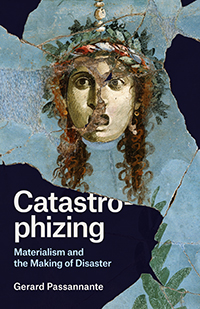
Gerard Passannante
Catastrophizing. Materialism and the Making of Disaster
University of Chicago Press
ISBN: 9780226612218
25,00 $
240 p.
PRESENTATION
When we catastrophize, we think the worst. We make too much of too little, or something of nothing. Yet what looks simply like a bad habit, Gerard Passannante argues, was also a spur to some of the daring conceptual innovations and feats of imagination that defined the intellectual and cultural history of the early modern period.
Reaching back to the time between the Renaissance and the Enlightenment, Passannante traces a history of catastrophizing through literary and philosophical encounters with materialism—the view that the world is composed of nothing but matter. As artists, poets, philosophers, and scholars pondered the physical causes and material stuff of the cosmos, they conjured up disasters out of thin air and responded as though to events that were befalling them. From Leonardo da Vinci’s imaginative experiments with nature’s destructive forces to the fevered fantasies of doomsday astrologers, from the self-fulfilling prophecies of Shakespeare’s tragic characters to the mental earthquakes that guided Kant toward his theory of the sublime, Passannante shows how and why the early moderns reached for disaster when they ventured beyond the limits of the sensible. He goes on to explore both the danger and the critical potential of thinking catastrophically in our own time.
CONTENTS
List of Illustrations
Introduction. Catastrophizing: A Beginner’s Guide
1. Leonardo’s Disasters
2. Earthquakes of the Mind
3. Shakespeare’s Catastrophic “Anything”
4. The Earthquake and the Microscope
5. Disaster before the Sublime; or, Kant’s Catastrophes
Afterword. Catastrophizing in the Age of Climate Change
Acknowledgments
Bibliography
Index
REVIEWS
Gordon Teskey, Harvard University
“In this deeply historical and urgently contemporary book, Gerard Passannante turns to the subtle ligature between philosophical materialism in the school of Lucretius and the imaginary (but not always, in the event, factually erroneous) phenomenon of disaster, or catastrophe, the sudden downturn and collapse. Following the perfect storm of materialist catastrophism, ‘the making of disaster,’ from Leonardo’s ‘Deluge’ drawings to Donne’s earthquakes and cosmic trepidations, to Shakespeare’s King Lear, Pascal’s twin abysses, and the Kantian sublime, and concluding with a wise analysis of the coming ecological catastrophe, this book is, among much else for literary historians, a forceful and caring intervention in our contemporary debate on the future.”
Susan Stewart, Princeton University
“With Catastrophizing, Passannante explores how Renaissance thinkers, including Leonardo, Donne, Montaigne, and Shakespeare, responded to sudden, inexplicable manifestations of nature’s powers—‘the action of the mind when it approaches the imperceptible.’ At a moment when the force of natural disasters could not be more sadly relevant, Passannante wisely reminds us that our predicament has an intellectual history—and that the worst responses would be either to succumb to fantasies of mastery or to utter helplessness.”
Stephen J. Campbell, Johns Hopkins University
“Passannante’s beautifully crafted study of the epistemological anxieties of early modern materialist thought shakes up the boundaries between comparative literature, art history, and history of science. It reveals new ways of juxtaposing historical voices and visions as diverse as Leonardo’s deluge drawings, Shakespeare’s aporeitic ‘anything’ and ‘nothing,’ Robert Hooke’s micrographic demonstrations of providential order, the Kantian sublime, and the Museum of Jurassic Technology. With its themes of cosmic disintegration, ecological collapse, and political upheaval, Catastrophizing is also very much a book about humanism and the humanities in the twenty-first century.”